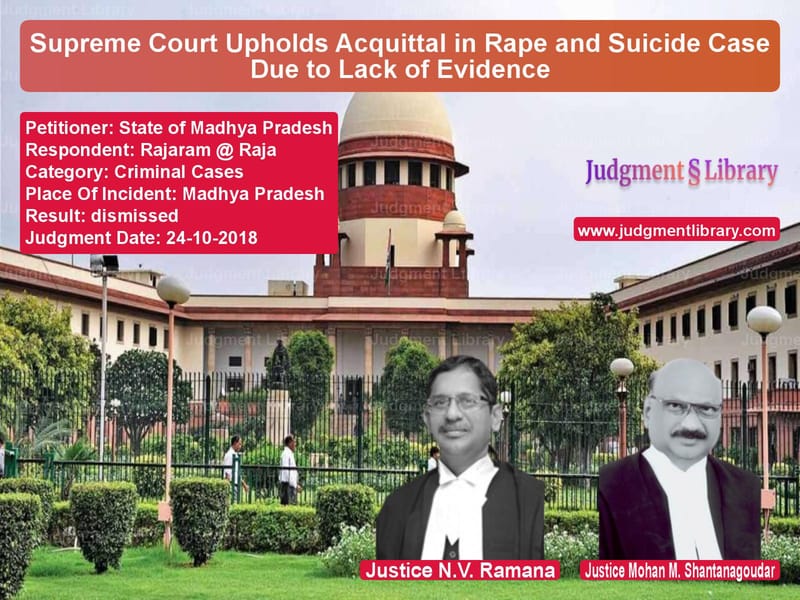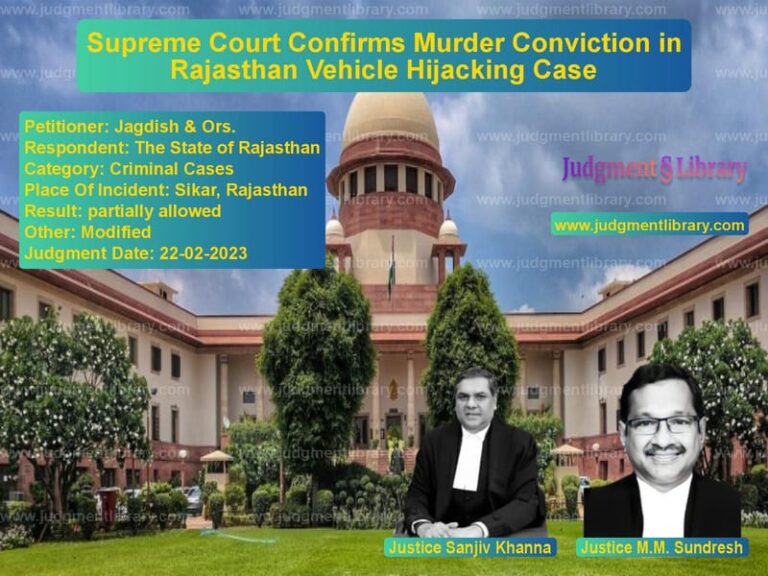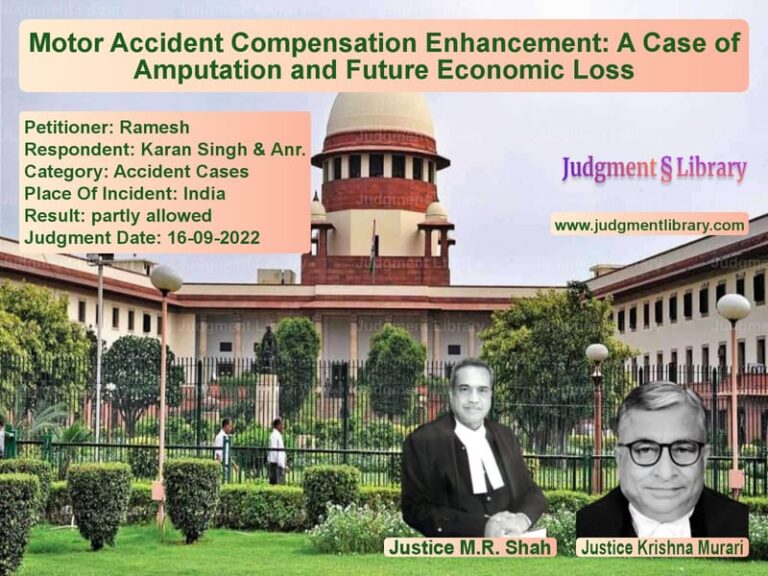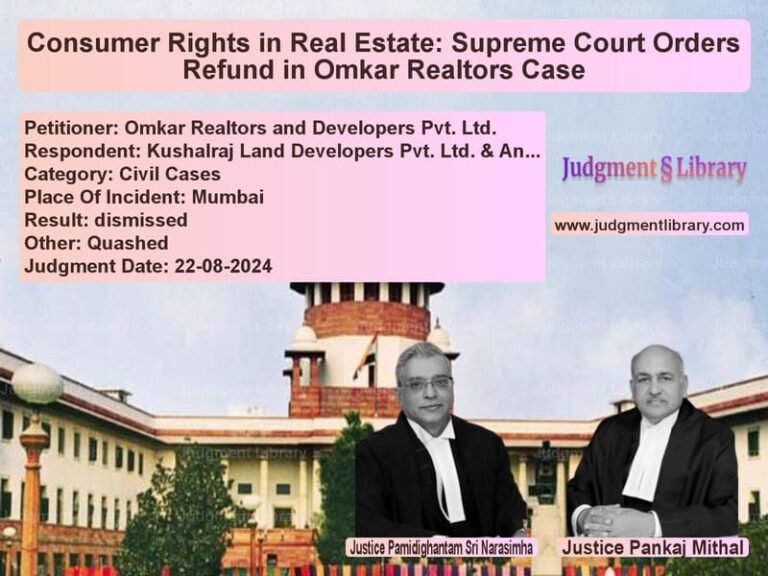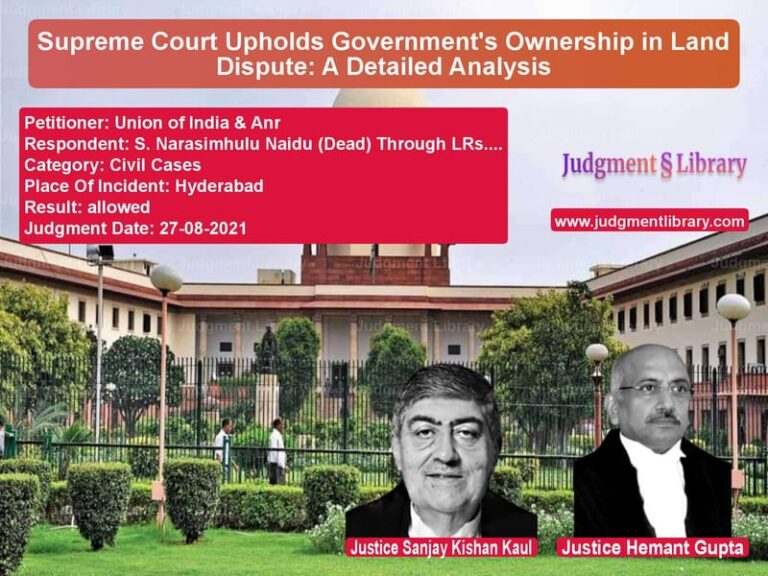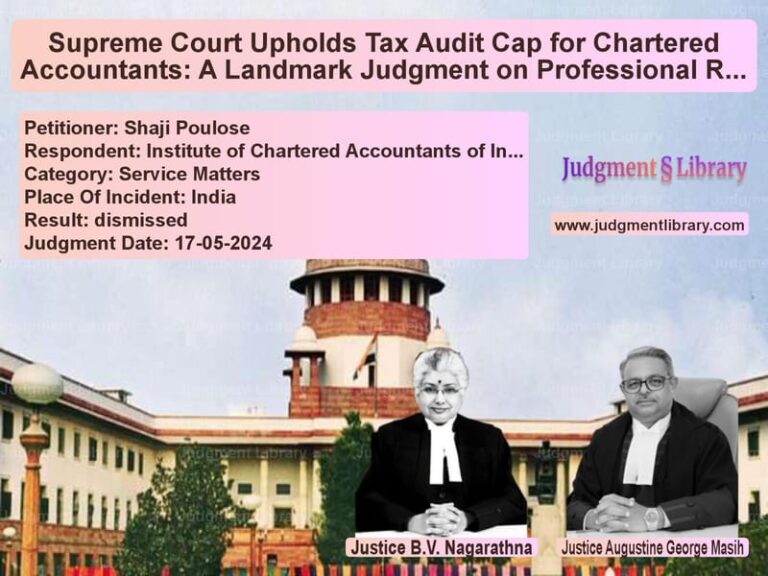Supreme Court Upholds Acquittal in Rape and Suicide Case Due to Lack of Evidence
The Supreme Court of India recently upheld the acquittal of Rajaram @ Raja, who was charged under Sections 376(1) and 306 of the Indian Penal Code (IPC). The case involved allegations that the respondent committed rape, leading the victim to commit suicide. The Court, after a detailed examination of the evidence, ruled that the prosecution failed to establish guilt beyond a reasonable doubt. The appeal by the State of Madhya Pradesh was dismissed.
Background of the Case
The case originated from an incident on April 13, 2004, when the victim allegedly consumed poison and died. Initially, the police registered a ‘Merg’ (unnatural death) case based on an intimation from the victim’s father, Dinesh Prasad Kushwaha. However, during the inquiry, it was alleged that the respondent had raped the victim, leading her to take her own life. Consequently, an FIR was registered under Sections 376 and 305 of IPC, and the respondent was arrested.
The Trial Court convicted the respondent and sentenced him to 10 years of rigorous imprisonment, along with a fine. On appeal, the Madhya Pradesh High Court set aside the conviction, acquitting the respondent due to a lack of substantive evidence. The State subsequently challenged this acquittal before the Supreme Court.
Key Issues Raised
- Was there sufficient evidence to prove that the respondent had raped the victim?
- Did the prosecution establish a direct link between the alleged rape and the victim’s suicide?
- Were the testimonies of key witnesses reliable and corroborated by medical or forensic evidence?
- Should the Supreme Court interfere with the High Court’s acquittal decision?
Arguments of the Petitioner (State of Madhya Pradesh)
- The prosecution relied on the testimony of Anju Kumari (PW-4), the victim’s sister, who claimed that the respondent had committed rape.
- The father of the victim, Dinesh Prasad Kushwaha (PW-3), also alleged that his daughter had confided in him about the rape before her death.
- It was argued that the victim’s suicide was a direct consequence of the rape, making the respondent liable under Section 306 IPC.
- The prosecution emphasized that the initial conviction by the Trial Court was justified and should be reinstated.
Arguments of the Respondent (Rajaram @ Raja)
- The defense highlighted that the prosecution’s case was based solely on circumstantial evidence, without medical or forensic corroboration.
- PW-4, the victim’s sister, admitted in cross-examination that she did not report anything to the police initially and made statements only later.
- The victim’s father (PW-3) had initially stated in his Merg report that his daughter consumed poison after he scolded her, with no mention of rape.
- The medical reports did not establish any conclusive evidence of rape.
- The High Court had rightly acquitted the respondent due to inconsistencies in the prosecution’s case.
Supreme Court’s Analysis
The Supreme Court thoroughly examined the evidence presented and noted several inconsistencies:
- PW-4’s testimony was unreliable as she changed her statements and admitted that she was influenced by the police.
- PW-3’s initial statement in the Merg report contradicted his later claims, making his testimony questionable.
- There was no forensic or medical evidence proving that the victim was sexually assaulted.
- The High Court had already found the prosecution’s case weak, and there was no substantial reason for the Supreme Court to interfere.
The Court emphasized:
“If the case is based on the evidence of a child witness, the court should seek corroboration from other evidence. If the possibility of tutoring appears to the court, it should be careful in accepting the evidence.”
The Court also referenced State of Kerala v. C.P. Rao and State of Punjab v. Ajaib Singh, reinforcing the principle that an acquittal should not be overturned unless it is found to be perverse or based on erroneous reasoning.
Final Judgment
The Supreme Court ruled:
- The appeal by the State of Madhya Pradesh was dismissed.
- The High Court’s acquittal of the respondent was upheld.
- Since there was no reliable evidence proving the allegations, the conviction by the Trial Court was rightly set aside.
The judgment concluded:
“In a case of acquittal, unless there is glaring infirmity in the appreciation of evidence or a perverse finding, this Court would not interfere.”
Implications of the Judgment
This ruling has significant implications for criminal law in India:
- Burden of Proof: The judgment reaffirms that allegations must be proven beyond reasonable doubt.
- Reliability of Witnesses: Courts must be cautious while relying on child witnesses and statements that change over time.
- Medical and Forensic Evidence: In cases of sexual assault, corroborative medical evidence is crucial.
- Deference to High Court Acquittals: The Supreme Court will not overturn acquittals unless there is a fundamental legal error.
This case serves as a crucial precedent for ensuring that convictions are based on solid and reliable evidence rather than circumstantial or unreliable testimonies.
Petitioner Name: State of Madhya Pradesh.Respondent Name: Rajaram @ Raja.Judgment By: Justice N.V. Ramana, Justice Mohan M. Shantanagoudar.Place Of Incident: Madhya Pradesh.Judgment Date: 24-10-2018.
Don’t miss out on the full details! Download the complete judgment in PDF format below and gain valuable insights instantly!
Download Judgment: State of Madhya Prad vs Rajaram @ Raja Supreme Court of India Judgment Dated 24-10-2018.pdf
Direct Downlaod Judgment: Direct downlaod this Judgment
See all petitions in Rape Cases
See all petitions in Suicide Cases
See all petitions in Bail and Anticipatory Bail
See all petitions in Judgment by N.V. Ramana
See all petitions in Judgment by Mohan M. Shantanagoudar
See all petitions in dismissed
See all petitions in supreme court of India judgments October 2018
See all petitions in 2018 judgments
See all posts in Criminal Cases Category
See all allowed petitions in Criminal Cases Category
See all Dismissed petitions in Criminal Cases Category
See all partially allowed petitions in Criminal Cases Category

